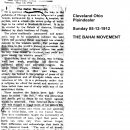Main menu
- ‘Abdu’l-Bahá’s Journey
- World Peace
- Stopping Racism in America
- Empowerment of Women
- More Principles...
- Prayer for America
The Bahá’í Movement
On a spacious site, overlooking the lake in the outskirts of Chicago is soon to be erected a great temple, surrounded by a hospice, a hospital, an asylum, and a school — the entire group of buildings to be called a Mashrak-El Azkar. It is to be erected by the Bahá’ís of America, liberally assisted by their brethren of Persia.
The plans confidently announced and apparently soon to be undertaken indicate the hold which the so-called Bahá’í movement has already secured in the western world. For perhaps the first time in the world’s history a movement for social, economic and religions reform has made its way from Orient to Occident, and made progress among the western people.
‘Abdul-Bahá, head of the Bahá’ís, was in Cleveland last week, preaching his doctrine of universal peace and universal religion. He comes from Persia, where the movement had its origin in 1844 and where it already has behind it the prestige of years of direst persecution and of triumphs which show it tenacious of life. It is a philosophy rather than a religion, an effort for social and economic reform rather than one of rivalry with any of the established faiths.
Three teachers the Bahá’ís have had. First came he called “the Báb,” who was persecuted and finally put to death by the forces against which he preached. Then followed Bahá’u’lláh, who was obliged to spend much of his mature life in exile and prison and whose son and spiritual heir is ‘Abdul-Bahá, now in the United States. They have consistently taught the universality of the brotherhood of man, urged that peace on earth can come only when nations forget their differences and acknowledge that truth is truth, wherever found. “The root of all knowledge is the knowledge of God,” wrote Bahá’u’lláh, emphasizing practically what each of the world’s great spiritual leaders has taught.
In order to bring the men of all races and nations together the Bahá’ís see the need of a universal language. They teach the emancipation of women, the elimination of wars through arbitration, the triumph of humanity over selfishness. It is a big program and one possessing many suggestions which even the defenders of the present order would not care to challenge.









